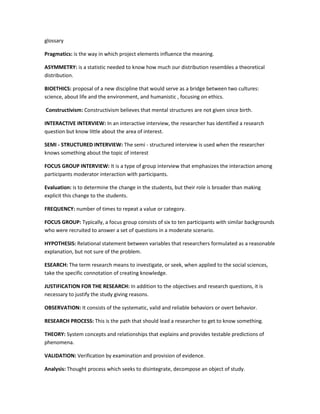
Glosario de metodologia del estudio
- 1. glossary Pragmatics: is the way in which project elements influence the meaning. ASYMMETRY: is a statistic needed to know how much our distribution resembles a theoretical distribution. BIOETHICS: proposal of a new discipline that would serve as a bridge between two cultures: science, about life and the environment, and humanistic , focusing on ethics. Constructivism: Constructivism believes that mental structures are not given since birth. INTERACTIVE INTERVIEW: In an interactive interview, the researcher has identified a research question but know little about the area of interest. SEMI - STRUCTURED INTERVIEW: The semi - structured interview is used when the researcher knows something about the topic of interest FOCUS GROUP INTERVIEW: It is a type of group interview that emphasizes the interaction among participants moderator interaction with participants. Evaluation: is to determine the change in the students, but their role is broader than making explicit this change to the students. FREQUENCY: number of times to repeat a value or category. FOCUS GROUP: Typically, a focus group consists of six to ten participants with similar backgrounds who were recruited to answer a set of questions in a moderate scenario. HYPOTHESIS: Relational statement between variables that researchers formulated as a reasonable explanation, but not sure of the problem. ESEARCH: The term research means to investigate, or seek, when applied to the social sciences, take the specific connotation of creating knowledge. JUSTIFICATION FOR THE RESEARCH: In addition to the objectives and research questions, it is necessary to justify the study giving reasons. OBSERVATION: It consists of the systematic, valid and reliable behaviors or overt behavior. RESEARCH PROCESS: This is the path that should lead a researcher to get to know something. THEORY: System concepts and relationships that explains and provides testable predictions of phenomena. VALIDATION: Verification by examination and provision of evidence. Analysis: Thought process which seeks to disintegrate, decompose an object of study.
- 2. Apprehend: Learning acquired through some taste, some passionate, intensely live experiences to assimilate them, rebuild them, criticize them, reinvent and incorporate them into everyday life. Compared learning: Things are perceived as a whole and are analyzed according to their similarities and differences. Learning by conditioning: Learning type occurs when two events or situations are associated, so that the appearance of one 's own reaction produces another. Learning by trial and error: Type of learning that takes past experiences that have lived with rightness or wrongness and at similar events are taken into account to fall or not in the same situation. Learning by imitation: Type of learning that assumes the existence of a model, example or demonstration and subsequent copying or repetition thereof. Empirical knowledge: All that is known and experienced every day through any of the organs and generates learning. Epistemology: It is the discipline that studies knowledge, is the theory of knowledge. Documentary Research: Its primary basis hemerográfico material collection, literature and history to understand the phenomenon under study.
